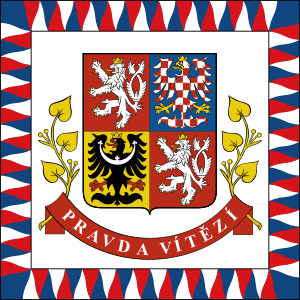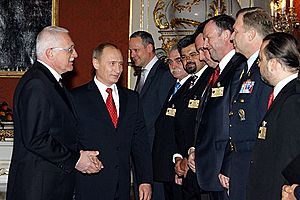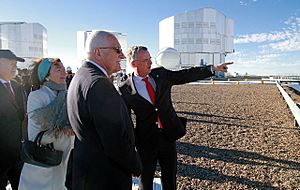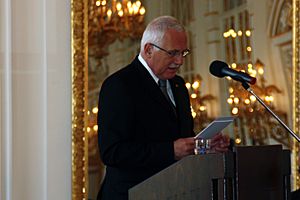Václav Klaus facts for kids
Quick facts for kids
Václav Klaus
|
|
|---|---|
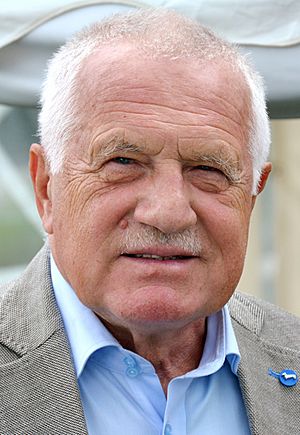
Klaus in 2015
|
|
| 2nd President of the Czech Republic | |
| In office 7 March 2003 – 7 March 2013 |
|
| Prime Minister | Vladimír Špidla Stanislav Gross Jiří Paroubek Mirek Topolánek Jan Fischer Petr Nečas |
| Preceded by | Václav Havel |
| Succeeded by | Miloš Zeman |
| Prime Minister of the Czech Republic | |
| In office 1 January 1993 – 2 January 1998 |
|
| President | Václav Havel |
| Preceded by | Position established |
| Succeeded by | Josef Tošovský |
| President of the Chamber of Deputies | |
| In office 17 July 1998 – 20 June 2002 |
|
| Preceded by | Miloš Zeman |
| Succeeded by | Lubomír Zaorálek |
| Leader of the Civic Democratic Party | |
| In office 21 April 1991 – 15 December 2002 |
|
| Preceded by | Position established |
| Succeeded by | Mirek Topolánek |
| Prime Minister of the Czech Republic (Federal part) | |
| In office 2 July 1992 – 31 December 1992 |
|
| President | Václav Havel |
| Preceded by | Petr Pithart |
| Succeeded by | Position abolished |
| Member of the Chamber of Deputies | |
| In office 7 June 1990 – 7 March 2003 |
|
| Minister of Finance of Czechoslovakia | |
| In office 10 December 1989 – 2 July 1992 |
|
| Prime Minister | Marián Čalfa |
| Preceded by | Jan Stejskal |
| Succeeded by | Jan Klak |
| Personal details | |
| Born | 19 June 1941 Prague, Protectorate of Bohemia and Moravia (now Czech Republic) |
| Political party | OF (1989–1991) ODS (1991–2003) Independent (2003–present) |
| Other political affiliations |
National Council of European Resistance |
| Height | 1.79 m (5 ft 10 in) |
| Spouse | Livia Mištinová (1968–present) |
| Children | Václav Jan |
| Relatives | Zoë Pastelle (niece) |
| Alma mater | University of Economics, Prague, Cornell University |
| Signature | |
| Website | Official website: http://www.klaus.cz/ |
Václav Klaus (born 19 June 1941) is a Czech economist and politician. He served as the second President of the Czech Republic from 2003 to 2013. Before that, he was the first Prime Minister of the Czech Republic from 1993 to 1998. He also led the Czech government when it was part of Czechoslovakia in 1992.
During the time of Communism in Czechoslovakia, Klaus worked as a bank clerk and forecaster. After the Velvet Revolution in November 1989, which ended Communist rule, he became the Minister of Finance. In 1991, he helped start the Civic Democratic Party (ODS).
Klaus was prime minister from 1992 to 1997. After his government ended, he became the president of the Chamber of Deputies (1998–2002). He was elected President of the Czech Republic in 2003 and re-elected in 2008. His time as president was known for his strong opinions on topics like climate change and the European Union. He also issued a large amnesty near the end of his term.
Klaus left active politics in 2013 but still shares his thoughts on important issues. His political ideas are sometimes called Klausism.
Contents
Early Life and Education
Václav Klaus was born in Prague in 1941, during the time of Nazi occupation. He grew up in the Vinohrady neighborhood. Klaus has said that he helped build barricades during the Prague uprising in May 1945, when he was only three years old.
He studied Economics of Foreign Trade at the University of Economics, Prague, finishing in 1963. He also spent time studying at universities in Italy and at Cornell University in the United States. After his studies, he worked at the State Institute of Economics. He later worked at the Czechoslovak State Bank from 1971 to 1986. In 1987, Klaus joined the Institute for Prognostics.
Becoming Prime Minister
Klaus entered politics during the Velvet Revolution in 1989. He offered his help as an economic advisor to the Civic Forum, a group that wanted to end Communist rule. On 10 December 1989, Klaus became Czechoslovakia's Minister of Finance.
In 1990, Klaus was chosen to lead the Civic Forum. A few months later, he led people who supported a free market economy to form the Civic Democratic Party (ODS).
After a time of strong economic growth, Klaus led ODS to win the most votes in the 1992 Czech legislative election. ODS became the largest party, and Klaus became the first democratically elected Prime Minister of the Czech Republic.
Klaus also played a key role in the dissolution of Czechoslovakia. He talked with the leader of the Slovak party, Vladimir Meciar. They agreed that if they couldn't form a closer union, they would create separate nations. Since they couldn't agree on a closer union, they decided to split Czechoslovakia into two independent countries on 1 January 1993.
Klaus's party again won the most votes in the 1996 Czech legislative election. He continued as prime minister in a minority government. However, he had to step down in 1997 due to questions about how his party was funded.
During his time as prime minister, President Václav Havel often criticized Klaus's plan to sell state-owned businesses to private owners. This plan was meant to quickly change the economy, but Havel believed it caused some economic problems.
Leader of the Opposition
In late 1997, Klaus was re-elected as the leader of ODS. Some members who disagreed with him left the party and formed a new one called the Freedom Union.
In the 1998 Czech legislative election, ODS came in second. Klaus then made an "Opposition Agreement" with Miloš Zeman, the leader of the Czech Social Democratic Party. This agreement allowed Zeman's party to govern with a minority, and in return, ODS received several important positions in parliament, including Klaus becoming the President of the Chamber of Deputies.
This agreement caused public protests. In the 2002 Czech legislative election, ODS was defeated again. Klaus decided not to run for party chairman but was made honorary chairman.
Presidency (2003–2013)
After losing two elections, Klaus decided to run for president to replace Václav Havel. He was elected President of the Czech Republic on 28 February 2003. He won with 142 votes out of 281. It was reported that he won with the support of Communist Members of Parliament, which Klaus denied.
Using Vetoes
Klaus had promised to use his Presidential Veto powers less often than his predecessor, Václav Havel. However, he actually used his veto more frequently. For example, he vetoed an Anti-Discrimination Law in 2008, saying it threatened personal freedoms. He also vetoed a bill about chemical policies, calling it a burden for businesses.
Views on Europe
Klaus was known for his Euroscepticism, meaning he was doubtful about the European Union. He believed that joining the EU would reduce the Czech Republic's independence. He did not fully support either side in the 2003 Czech European Union membership referendum.
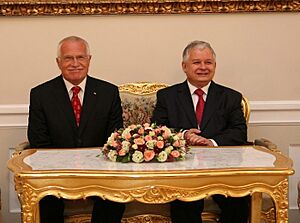
Klaus often said that EU member states were losing their independence to the EU. He even called for the EU to be "scrapped" and replaced with a simple free trade area. He also claimed the EU was "as big a threat to freedom as the Soviet Union was."
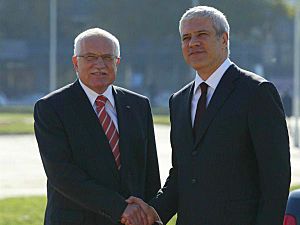
In 2008, Klaus held a press conference in Ireland with a group campaigning against the Lisbon Treaty. This was seen as unusual by the Irish government.
Speaking to the European Parliament
On 19 February 2009, Klaus gave a speech to the European Parliament. He criticized what he saw as the EU's lack of democracy and its economic policies. He said that the EU's decision-making system was different from a normal democracy. He also mentioned that there was a big distance between citizens and EU representatives, which he called a "democratic deficit."
He warned that trying to speed up and deepen European integration could harm the positive things achieved in Europe. He hoped that citizens would not feel forced to accept the EU project.
Signing the Lisbon Treaty
Klaus was the last head of state in the EU to sign the Treaty of Lisbon. Other European leaders were frustrated by his delay. However, the Czech Prime Minister Jan Fischer said that Klaus would eventually sign it. Václav Klaus finally signed the Treaty of Lisbon on 3 November 2009.
Views on Russia
Klaus sought to work with Russia on issues like energy. In the 1990s, he supported oil and gas agreements between the Czech Republic and Russia.
In 2006, The Economist described Klaus as one of Russian President Vladimir Putin's "warmest admirers." Klaus received the 2007 Pushkin Medal from Putin for promoting Russian culture. He often used the Russian language when speaking to Putin.
However, in a 2009 interview, Klaus said that Russia was not a threat but was still a big and ambitious country that the Czech authorities should be careful of.
Views on Kosovo
Klaus criticized the NATO bombing of Yugoslavia during the Kosovo War. He also often criticized Kosovo's declaration of independence in 2008. He believed that recognizing Kosovo would create a dangerous situation in Europe. He compared Serbia's situation to the 1938 Munich Agreement. During a visit to Serbia in 2011, Klaus stated that the Czech Republic would not appoint an ambassador to Kosovo as long as he was president.
Re-election as President
The 2008 Czech presidential election used recorded voting instead of a secret ballot. This change was requested by several parties. Klaus's opponent was Jan Švejnar, an economics professor.
The election had several rounds. In the third round, where only a simple majority was needed, Klaus won by one vote. His first term ended on 7 March 2008, and he took his oath for his second term on the same day. His second term ended on 6 March 2013.
Chile Pen Incident
In April 2011, a video showed Klaus taking a pen during a state visit to Chile. This was widely reported. Klaus said the incident was exaggerated, as official pens are usually free for visitors to take. A spokeswoman for the Chilean President confirmed that guests were allowed to take pens from meetings.
Australian Parliament House Incident
In July 2011, President Klaus visited Canberra, Australia. He was invited for an interview at the Parliament House studios. However, he was asked to go through standard security checks like any member of the public. Klaus refused to wait in line and offered to do the interview at his hotel, but this offer was declined.
Klaus's staff supported his decision, saying it was disrespectful to check a head of state.
Opposition to Prague Gay Pride Parade
In 2011, Klaus's aide made comments criticizing the Prague gay pride parade, calling it a "political demonstration of a world with deformed values." These comments were widely criticized by Czech politicians and ambassadors. Klaus defended his aide's comments, saying that homosexuality should be tolerated but not celebrated.
Airsoft Gun Attack
On 28 September 2012, Klaus was attacked during a ceremony in Chrastava. A 26-year-old man, Pavel Vondrouš, used an airsoft gun to shoot Klaus in the arm. Klaus was taken to the hospital for minor bruising. The attacker was later detained and said he acted because politicians were ignoring people's problems. He received a suspended sentence.
The lack of action from the President's bodyguards was heavily criticized, and the head of security resigned.
2013 Amnesty and Controversy
On 1 January 2013, Klaus announced an amnesty to mark 20 years of the Czech Republic's independence. This amnesty released many prisoners and ended some long-running corruption trials. Over 6,300 prisoners were released.
The amnesty caused a lot of public anger, especially because it ended high-profile corruption cases. People compared it to amnesties given by his predecessor, Václav Havel.
A public petition was started to ask the Senate to charge President Klaus with serious misconduct before the Constitutional court. This would have been a form of impeachment. The Senate voted to charge Klaus on 4 March 2013, based on five alleged violations of the constitution, including the amnesty. However, Klaus's term ended the next day, so the court's decision became a formality.
After Presidency
After his presidency ended in 2013, Klaus continued to share his views. He was a senior fellow at the Cato Institute for a short time.
In 2014, Klaus said that Ukraine was an "artificially created state" and that the Russian actions there were part of a "civil war." He also described the Euromaidan protests as an "artificial event created by the West."
In the 2018 Czech presidential election, Klaus supported his former political opponent Miloš Zeman.
In November 2024, Klaus received media attention for stating that female defense ministers are "absurd nonsense."
Tricolour Party
Klaus's son, Václav Klaus Jr., became a politician. After being expelled from the Civic Democratic Party in 2019, he started a new party called the Tricolour Citizens' Movement. Václav Klaus joined Tricolour and became the party's foreign relations adviser.
COVID-19 Regulations
On 28 October 2020, Klaus refused to wear a face mask at a public event, breaking COVID-19 rules. He said that people who wear masks support things like illegal migration and a stronger European Union. The Prague Public Health Office fined him 10,000 CZK. In February 2021, Klaus tested positive for COVID-19 but recovered at home.
Other Activities
Economic Views
In 1995, while prime minister, Klaus became a Professor of Finance at the University of Economics, Prague. He has occasionally taught economics seminars there, focusing on his free market ideas.
Klaus is a strong supporter of free market economics, inspired by thinkers like Friedrich Hayek and Milton Friedman. He believes that economic changes and new laws must happen together.
Václav Klaus has received nearly 50 honorary degrees and has written over 20 books on social, political, and economic topics. He is a member of the Mont Pelerin Society and has published articles in the Cato Journal. In 2008, he received the Julian L. Simon Memorial Award.
Views on Climate Change
Klaus does not believe that global warming is mainly caused by humans. He has called the Intergovernmental Panel on Climate Change "a group of politicized scientists." He also claimed that other politicians don't speak out about their doubts because of "political correctness."
In 2007, Klaus said that "Environmentalism should belong in the social sciences, along with other 'isms' such as communism, feminism, and liberalism." He compared environmentalism to a religion or a "modern counterpart of communism."
In a 2007 article, Klaus described environmentalism as "the biggest threat to freedom, democracy, a market economy and prosperity." He believed that current debates on environmental issues were designed to limit freedom. He also said that "Environmentalism, not preservation of nature (and of environment), is a leftist ideology."
At the 2007 United Nations Climate Change Conference, Klaus again rejected the idea of human-caused global warming. He called for a second group of scientists to create different reports and for countries to set their own plans.
In 2007, Klaus published a book called Blue Planet in Green Shackles. In the book, he claims that the theory of global warming "may be a bad theory, it may also be a valueless theory, but in any case it is a very dangerous theory."
At the 2009 United Nations Climate Change Conference, Klaus spoke against the meeting, calling it "propagandistic." In 2011, he described global warming as a "communist conspiracy."
Personal Life
Václav Klaus is married to Livia Klausová, who is a Slovak economist. They have two sons, Václav Klaus Jr., who is also a politician, and Jan, an economist. They also have five grandchildren.
State Awards
National Awards
 Grand Cross of the Order of the White Lion (28 October 2019)
Grand Cross of the Order of the White Lion (28 October 2019) Former ex-officio Sovereign of the Order of the White Lion (7 March 2003–7 March 2013)
Former ex-officio Sovereign of the Order of the White Lion (7 March 2003–7 March 2013) Former ex-officio Sovereign of the Order of Tomáš Garrigue Masaryk (7 March 2003–7 March 2013)
Former ex-officio Sovereign of the Order of Tomáš Garrigue Masaryk (7 March 2003–7 March 2013)
International Awards
 Austria: Grand Star of the Decoration for Services to the Republic of Austria (15 May 2009)
Austria: Grand Star of the Decoration for Services to the Republic of Austria (15 May 2009) Germany:
Germany:
-
 Saxony: Recipient of the Order of Merit of the Free State of Saxony (17 May 2008)
Saxony: Recipient of the Order of Merit of the Free State of Saxony (17 May 2008)
 Lithuania: Grand Cross with Chain of the Order of Vytautas the Great (9 April 2009)
Lithuania: Grand Cross with Chain of the Order of Vytautas the Great (9 April 2009) Poland: Knight of the Order of the White Eagle (10 July 2007)
Poland: Knight of the Order of the White Eagle (10 July 2007) Russia: Recipient of the Medal of Pushkin (27 December 2007)
Russia: Recipient of the Medal of Pushkin (27 December 2007) Slovakia: First Class of the Order of the White Double Cross (6 March 2013)
Slovakia: First Class of the Order of the White Double Cross (6 March 2013) Spain: Collar of the Order of Isabella the Catholic (24 September 2004)
Spain: Collar of the Order of Isabella the Catholic (24 September 2004) Albania:Doctor Honoris Causa University of Tirana, For the valuable contribution to the development of the Albanian state, 2010
Albania:Doctor Honoris Causa University of Tirana, For the valuable contribution to the development of the Albanian state, 2010
See also
 In Spanish: Václav Klaus para niños
In Spanish: Václav Klaus para niños
 | Sharif Bey |
 | Hale Woodruff |
 | Richmond Barthé |
 | Purvis Young |


